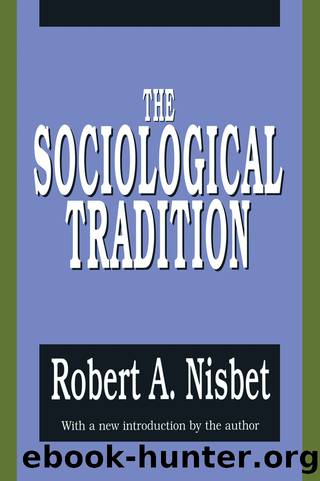The Sociological Tradition by Peretz Bernstein

Author:Peretz Bernstein [Bernstein, Peretz]
Language: eng
Format: epub
Tags: Social Science, Anthropology, General, Sociology, Regional Studies
ISBN: 9781315135052
Google: WX1rtAEACAAJ
Publisher: Routledge
Published: 1966-01-15T04:36:04+00:00
5 Status
The Emergence of Class
"The owl of Minerva," Hegel wrote, "flies at twilight." In no area of sociology is the appositeness of this maxim more striking than with respect to the study of social class. Only after the historic and essential bases of social class in European society had become tenuous and uncertain, had become threatened by forces such as political centralization, citizenship, and mass educationâforces which would, in the long run, make class the weakest of all the traditional social unities under the modern regimeâdid the study of social stratification burst forth in full brilliance. Central to sociology's interest in stratification is its sharp distinction, from Tocqueville on, between social class and social status.
Interest in social hierarchy is not, to be sure, peculiar to the nineteenth century. The far-reaching idea of "the great chain of being" that had, from Plato down to the modern Enlightenment, fascinated European philosophers, suffusing metaphysics, biology, and cosmography, could not but have included the notion of a social chain of being: one that stretched from the lowly peasant through intermediate ranks and stations to monarch or emperor. References to "ranks," "orders," and "degrees" are strung out continuously in social and moral thought from the late Middle Ages on. A great deal of the social philosophy of Thomas Aquinas concerns the hierarchy of the organic community. Aside from a few religiously inspired equalitarian groups spawned for the most part by the Reformationâthe chiliastic, millennial, and apocalypticâit is hard to find moral philosophers prior to the mid-seventeenth century who would not have concurred with Shakespeare's words: "Take but degree away, untune that string, and hark! what discord follows; each thing meets in mere oppugnancy." Elizabethan dramatists and philosophical essayists were literally obsessed by rank, estate, and station and their absolute necessity in the social order.1
When we come to Hobbes, however, in the middle of the seventeenth century, we find a suspicion of both aristocracy and the middle class; a suspicion founded on Hobbes's distrust of all intermediate social bodies in the monolithic structure of his Leviathan.2 In natural-law theory as a whole in the century there is, with the one remarkable exception of Althusius, an exclusion of social class and rank from systematic consideration. The hostility that natural-law theorists manifested for the most part toward guilds and other corporations was extended, in theory at least, to aristocracy. Unlike such essential concepts as those of individual, state, and contract, the concept of social class had little if any theoretical role. Althusius, as I have suggested, is a major exception. His vision of society had as much room in it for the ordered gradations of social hierarchy as for community and corporation. But he stands alone.
With the onset of the Enlightenment, we see a sharp rise in criticism of traditional hierarchyâproceeding from the philosophes' general distaste for everything feudal in originâand also in analytical interest in stratification. Rousseau's Discourse on the Origin of Inequality, for all its polemical overtones, contains a remarkable account of social stratification set within a developmental perspective and pivoted upon private property.
Download
This site does not store any files on its server. We only index and link to content provided by other sites. Please contact the content providers to delete copyright contents if any and email us, we'll remove relevant links or contents immediately.
Cecilia; Or, Memoirs of an Heiress — Volume 1 by Fanny Burney(31331)
Cecilia; Or, Memoirs of an Heiress — Volume 3 by Fanny Burney(30933)
Cecilia; Or, Memoirs of an Heiress — Volume 2 by Fanny Burney(30889)
The Great Music City by Andrea Baker(21262)
We're Going to Need More Wine by Gabrielle Union(18072)
Bombshells: Glamour Girls of a Lifetime by Sullivan Steve(13107)
Pimp by Iceberg Slim(12928)
All the Missing Girls by Megan Miranda(12746)
Fifty Shades Freed by E L James(12448)
Norse Mythology by Gaiman Neil(11879)
Talking to Strangers by Malcolm Gladwell(11874)
Crazy Rich Asians by Kevin Kwan(8346)
Mindhunter: Inside the FBI's Elite Serial Crime Unit by John E. Douglas & Mark Olshaker(7832)
The Lost Art of Listening by Michael P. Nichols(6469)
Enlightenment Now: The Case for Reason, Science, Humanism, and Progress by Steven Pinker(6405)
Bad Blood by John Carreyrou(5766)
The Four Agreements by Don Miguel Ruiz(5510)
Weapons of Math Destruction by Cathy O'Neil(5034)
We Need to Talk by Celeste Headlee(4868)
